Snapit Tablet 2's
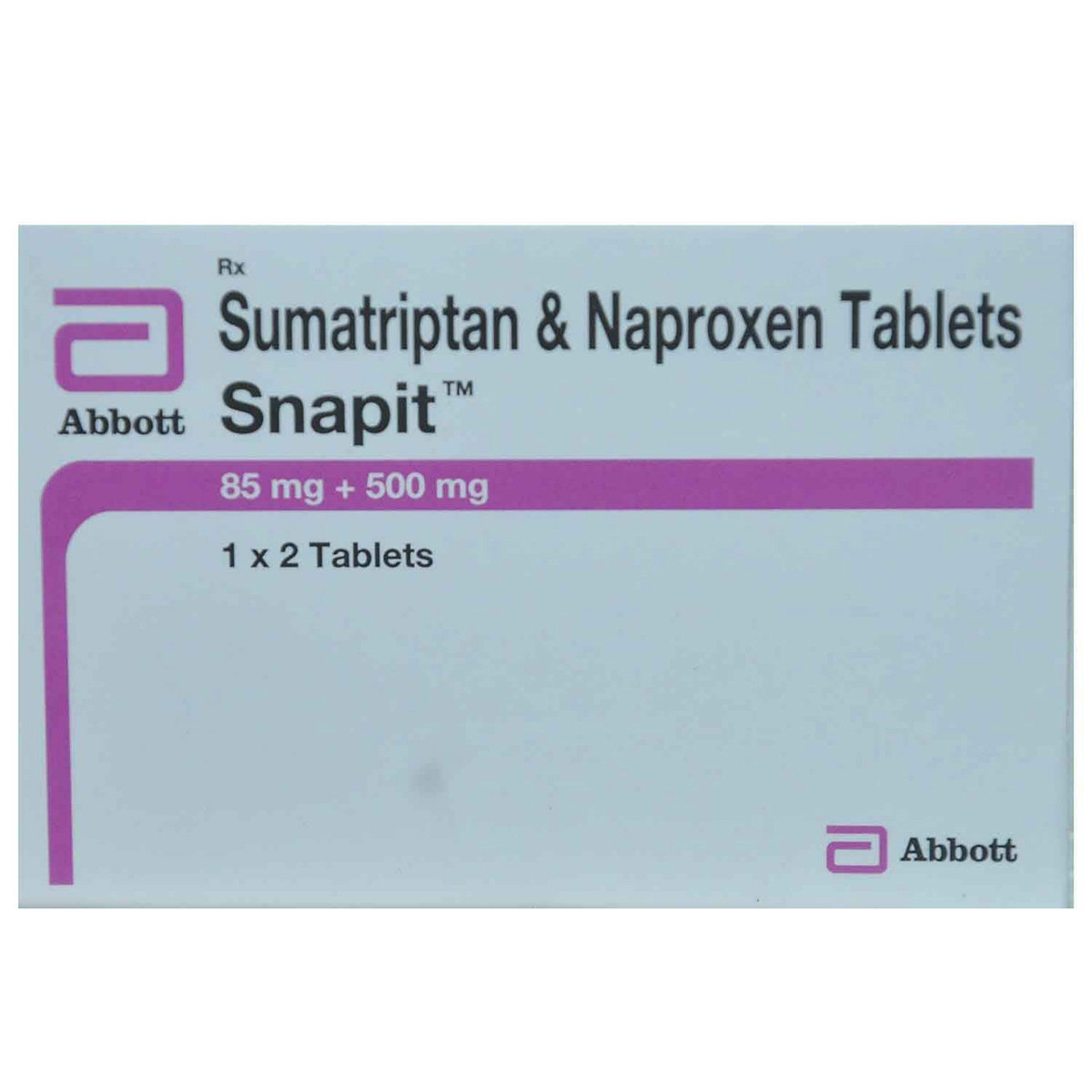
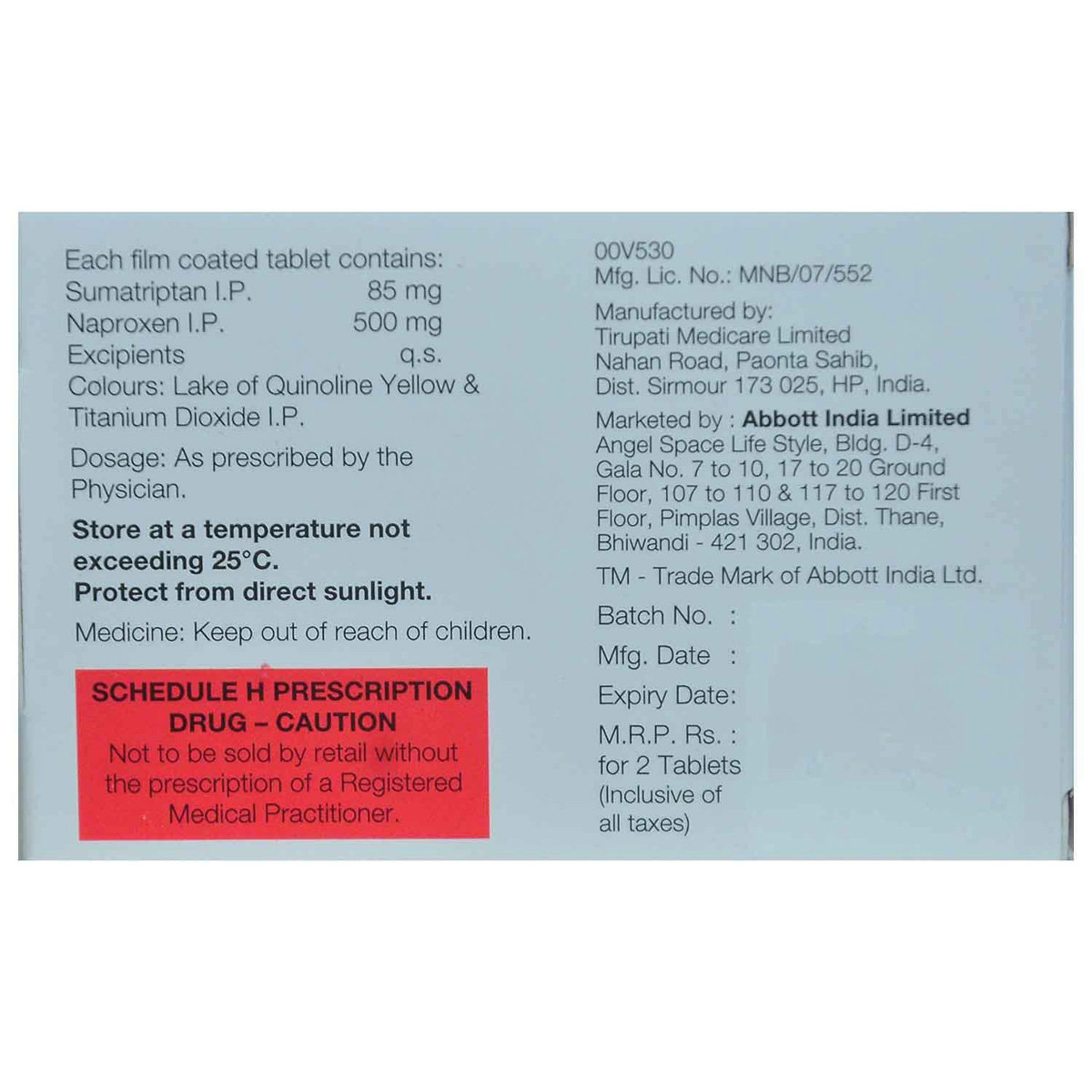
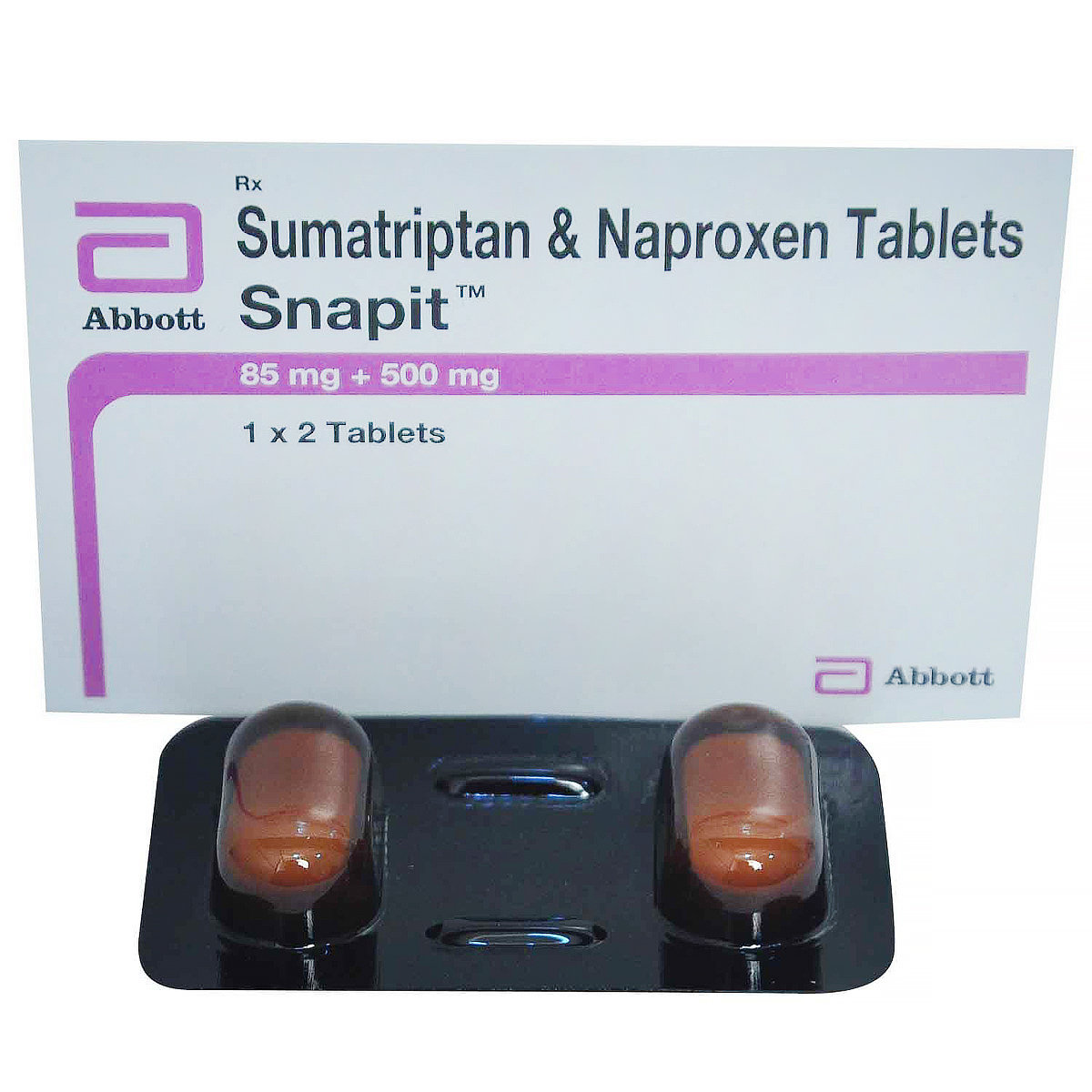
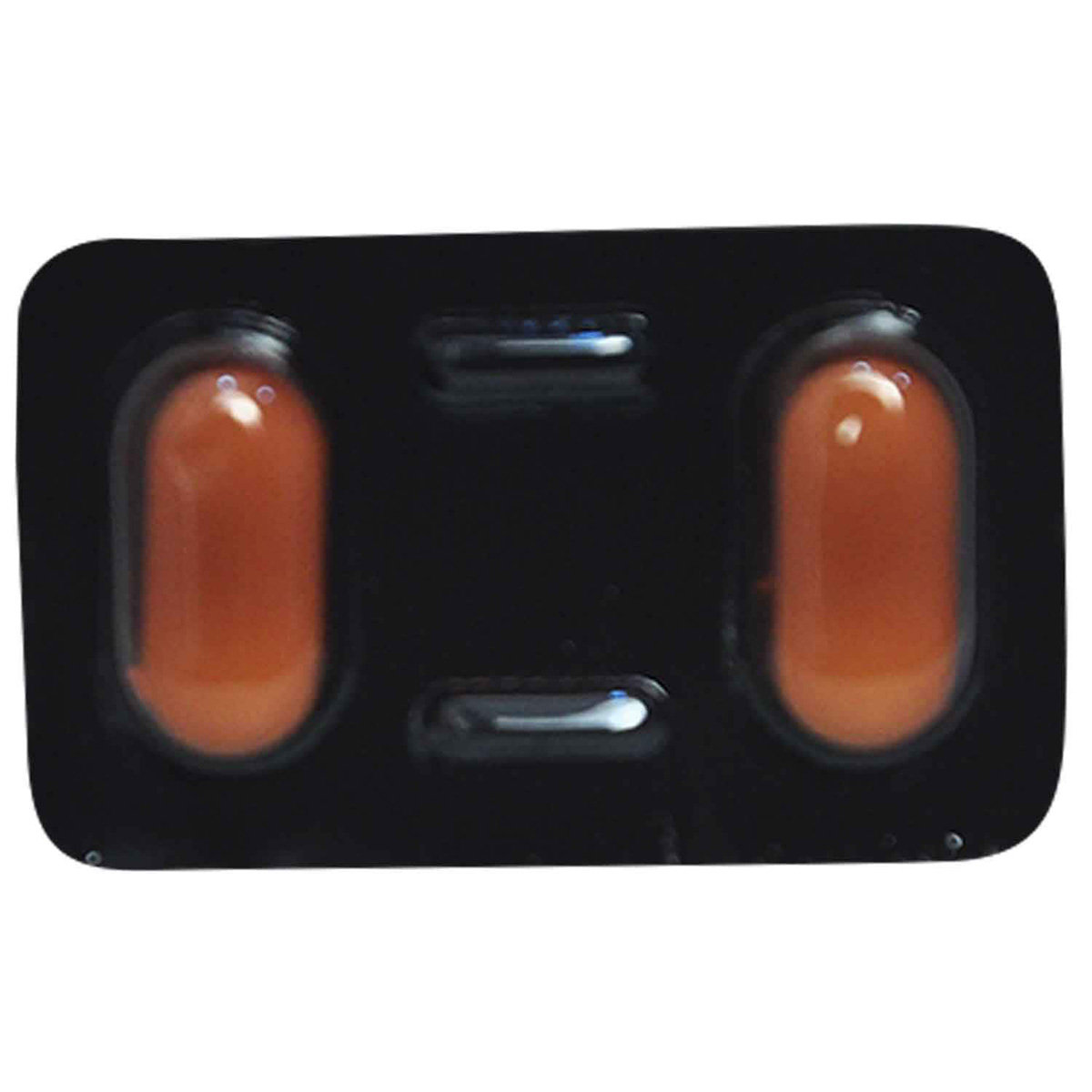
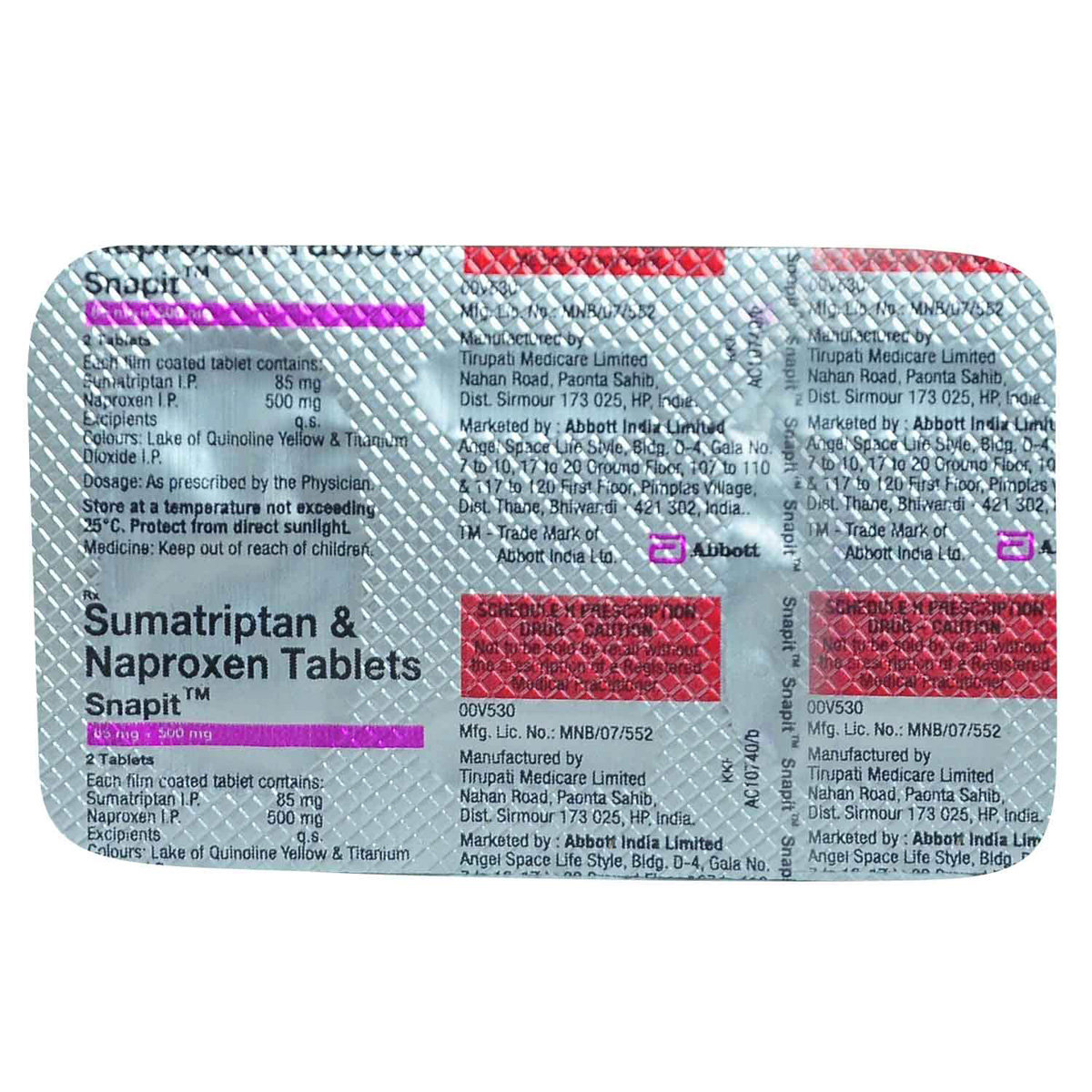
MRP ₹144
(Inclusive of all Taxes)
₹21.6 Cashback (15%)
Know Your Delivery Time
Provide Delivery Location

Secure Payment

India's Most Trusted Pharmacy

Genuine Products
Composition :
Manufacturer/Marketer :
Consume Type :
Return Policy :
Expires on or after :
About Snapit Tablet
Snapit Tablet is used to prevent migraine symptoms such as headache, nausea, and vomiting. Migraine is a neurological condition which is characterised by an intense pulsating, throbbing, pounding, debilitating headache which usually occurs on one side of the head; however, it can occur on both sides or shift. Hormonal changes, stress, bright lights, loud sounds, and certain foods and drinks can trigger migraine headaches.
Snapit Tablet is a combination of two drugs: Sumatriptan and Naproxen. Sumatriptan acts on the serotonin (5-HT) receptors located in the brain, thereby causing the narrowing of the brain's blood vessels, which in turn affects the blood flow patterns associated with headache. Naproxen is a painkiller which works by blocking the effect of chemical messengers that cause pain. Thus, Snapit Tablet prevents symptoms of migraine-like headache, nausea and vomiting.
You are advised to take Snapit Tablet as long as your doctor has prescribed it for you, depending on your medical condition. In some cases, you may experience certain common side effects, such as dizziness, sleepiness, nausea, chest discomfort, dry mouth, irregular heartbeats, and heartburn. Most of these side effects do not require medical attention and will resolve gradually over time. However, you are advised to talk to your doctor if you experience these side effects persistently.
Consult your doctor if you are pregnant or breastfeeding. Snapit Tablet should not be taken during the third trimester of pregnancy. Snapit Tablet may cause drowsiness and dizziness, so drive with caution. Snapit Tablet should not be given to children as safety and efficacy have not been established. Avoid consuming alcohol with Snapit Tablet as it could lead to increased drowsiness and dizziness. Keep your doctor informed about your health condition and medicines to rule out any side effects.
Uses of Snapit Tablet
Snapit Tablet is used in the treatment of migraine. The detailed uses of Snapit Tablet are as follows:
- Treats Migraine Headaches: Snapit Tablet effectively treats acute migraine attacks with or without aura by narrowing the swollen blood vessels around the brain and by blocking the effect of chemical messengers that cause pain.
- Relieves Migraine-Associated Symptoms: Snapit Tablet helps relieve symptoms such as nausea, vomiting, headache, and sensitivity to light and sound.

Have a query?
Directions for Use
- Snapit Tablet can be taken with or without food or as advised by a doctor.
- It is advised to take Snapit Tablet exactly as prescribed by your doctor, following the recommended dosage and duration to get optimal results.
- Swallow it as a whole with a glass of water.
- Do not crush, chew, or break it.
Medicinal Benefits
Snapit Tablet is a combination of two drugs, Sumatriptan and Naproxen. Snapit Tablet is indicated for the acute treatment of migraine with or without aura. Sumatriptan is a serotonin receptor agonist that acts on the serotonin (5-HT) receptors located in the brain, which causes the narrowing of the brain's blood vessels, thereby affecting the blood flow patterns with a headache. Naproxen is a pain killer which works by blocking the effect of a chemical messenger known as cyclo-oxygenase (COX) enzymes that make other chemical prostaglandins. By blocking the effect of COX enzymes, fewer prostaglandins are produced, thereby reducing pain in migraine.
How Snapit Tablet Works
Storage
- Chest pain may last for a while and needs immediate medical attention as it is a significant health issue to be attended to.
- Take rest and refrain from doing physical activity for a while, and restart after a few days.
- Try applying an ice pack to the strained area for at least 20 minutes thrice a day. Ice pack thus helps reduce inflammation.
- Sit upright and maintain proper posture if there is persistent chest pain. • Use extra pillows to elevate your position and prop your chest up while sleeping.
- Always wear loose-fitting clothes suitable for your activity during hot flashes.
- Include a diet containing fruits like watermelon, grapes, bananas and green leafy vegetables.
- Drink plenty of water and stay hydrated.
- Stay calm and lower your anxiety by practising yoga or meditation.
- Inform your doctor about dizziness symptoms. They may adjust your medication regimen or prescribe additional medications to manage symptoms.
- Follow your doctor's instructions for taking medication, and take it at the same time every day to minimize dizziness.
- When standing up, do so slowly and carefully to avoid sudden dizziness.
- Avoid making sudden movements, such as turning or bending quickly, which can exacerbate dizziness.
- Drink plenty of water throughout the day to stay hydrated and help alleviate dizziness symptoms.
- If you're feeling dizzy, sit or lie down and rest until the dizziness passes.
- Track when dizziness occurs and any factors that may trigger it, and share this information with your doctor to help manage symptoms.
- Avoid driving or operating machinery or activities that require high focus until you know how the medication affects you.
- Maintain a fixed sleeping schedule, create a relaxing bedtime routine and ensure your sleeping space is comfortable to maximize your sleep quality.
- Limit alcohol and caffeine as these may worsen drowsiness and disturb sleep patterns.
- Drink plenty of water as it helps with alertness and keeps you hydrated and for overall well-being.
- Moderate physical activity can improve energy levels, but avoid intense workouts right before bedtime.
- Change positions or take a break from activity to relieve symptoms.
- Avoid postures that put a lot of pressure on just one area of the body.
- If you have vitamin deficiency, take supplements or change your diet.
- Exercise regularly like cycling, walking or swimming.
- Avoid sitting with your legs crossed.
- Clench and unclench your fists and wiggle your toes.
- Massage the affected area.
- Inform your doctor about the nausea and discuss possible alternatives to the medication or adjustments to the dosage.
- Divide your daily food intake into smaller, more frequent meals to reduce nausea.
- Opt for bland, easily digestible foods like crackers, toast, plain rice, bananas, and applesauce.
- Avoid certain foods that can trigger nausea, such as fatty, greasy, spicy, and smelly foods.
- Drink plenty of fluids, such as water, clear broth, or electrolyte-rich beverages like coconut water or sports drinks.
- Use ginger (tea, ale, or candies) to help relieve nausea.
- Get adequate rest and also avoid strenuous activities that can worsen nausea.
- Talk to your doctor about taking anti-nausea medication if your nausea is severe.
- Record when your nausea occurs, what triggers it, and what provides relief to help you identify patterns and manage your symptoms more effectively.
- Take medications with food (if recommended): It can help prevent stomach distress and indigestion.
- Eat smaller, more frequent meals: Divide daily food intake into smaller, more frequent meals to ease digestion.
- Avoid trigger foods: Identify and avoid foods that trigger indigestion, such as spicy, fatty, or acidic foods.
- Stay upright after eating: Sit or stand upright for at least 1-2 hours after eating to prevent stomach acid from flowing into the oesophagus.
- Avoid carbonated drinks: Avoid drinking carbonated beverages, such as soda or beer, which can worsen indigestion.
- Manage stress: To alleviate indigestion, engage in stress-reducing activities like deep breathing exercises or meditation.
- Consult a doctor if needed: If indigestion worsens or persists, consult a healthcare professional to adjust the medication regimen or explore alternative treatments.
What if I have taken an overdose of Snapit Tablet
Drug Warnings
Do not take Snapit Tablet if you are allergic to any of its contents; if you have had any recent heart surgery or stroke, blood circulation problems, heart problems, narrowing of blood vessels to the stomach, legs, arms or kidneys, or uncontrolled high blood pressure; if you are taking MAO inhibitors, antidepressant or have taken them in the last 14 days; or if you have taken 5-HT agonists called triptan or ergotamine in the last 24 hours. Inform your doctor if you have high blood pressure, asthma, diabetes, epilepsy, overweight, heart, kidney or liver problems. Consult your doctor if you are pregnant or breastfeeding. Snapit Tablet should not be taken during the third trimester of pregnancy. Snapit Tablet may cause drowsiness and dizziness, so drive only if you are alert. Snapit Tablet should not be given to children as safety and effectiveness have not been established. Avoid consuming alcohol with Snapit Tablet as it could lead to increased drowsiness. Stop taking Snapit Tablet and consult your doctor immediately if you have stomach pain or any signs of bleeding in the intestine or stomach, such as blood in stools.
Drug-Drug Interactions
Drug-Drug Interactions
Login/Sign Up
Coadministration of Ketorolac with Snapit Tablet can increase the risk or severity of gastric bleeding and ulceration.
How to manage the interaction:
Taking Ketorolac with Snapit Tablet together is generally avoided as it can possibly result in an interaction, it can be taken if your doctor has advised it. However, if you notice any unusual bleeding or bruising, other signs of bleeding, dizziness, lightheadedness, red or black tarry stools, coughing up or vomiting blood, severe headache, and weakness, you should contact your doctor immediately. Do not stop using any medications without first talking to your doctor.
Taking cidofovir with Snapit Tablet may increase the risk or severity of kidney problems
How to manage the interaction:
Taking Snapit Tablet with Cidofovir is generally avoided as it can possibly result in an interaction. You should seek immediate medical attention if you develop signs and symptoms such as nausea, vomiting, loss of hunger, increased or decreased urination, sudden weight gain or weight loss, fluid retention, swelling, shortness of breath, bone pain, muscle cramps, tiredness, weakness, dizziness, confusion, and irregular heart rhythm.
Co-administration of Snapit Tablet with Meloxicam can increase the risk or severity of gastric bleeding, ulceration, and rarely, perforation leading to serious blood loss.
How to manage the interaction:
Taking Meloxicam with Snapit Tablet is not advised as it can possibly result in an interaction, it can be taken if your doctor has advised it. You should seek immediate medical attention if you experience any unusual bleeding or bruising or have other signs and symptoms of bleeding such as dizziness; lightheadedness; red or black, tarry stools; coughing up or vomiting fresh or dried blood that looks like coffee grounds; severe headache; and weakness.
Coadministration of Snapit Tablet with Methylergometrine can reduce the blood flow and increase the risk of high blood pressure or heart-related problems.
How to manage the interaction:
Taking Snapit Tablet with Methylergometrine together can possibly result in an interaction, it can be taken if your doctor has advised it. However, if you notice any symptoms like sudden dizziness, lightheadedness, fainting, shortness of breath, or rapid heartbeat, contact your doctor immediately. Do not discontinue any medications without first consulting your doctor.
Coadministration of Bromocriptine with Snapit Tablet can increase the risk or severity of side effects like high blood pressure or heart-related disorders.
How to manage the interaction:
Although there is an interaction between Bromocriptine and Snapit Tablet, they can be taken together if prescribed by a doctor. However, if you experience abdominal pain, nausea, vomiting, numbness or tingling, muscle pain or weakness, blue or purple discoloration of fingers or toes, pale or cold skin, chest pain or tightness, irregular heartbeat, severe headache, shortness of breath, blurred vision, confusion, consult a doctor. Do not discontinue any medication without consulting a doctor.
Coadministration of Dihydroergotamine with Snapit Tablet can reduce blood flow and increase the risk of serious side effects such as high blood pressure or heart-related side effects.
How to manage the interaction:
Taking Dihydroergotamine with Snapit Tablet is not recommended, please consult your doctor before taking it. However, if you experience abdominal pain, nausea, vomiting, numbness or tingling, muscle pain or weakness, blue or purple discoloration of fingers or toes, pale or cold skin, chest pain or tightness, irregular heartbeat, severe headache, shortness of breath, blurred vision, confusion, call a doctor. Do not discontinue any medication without consulting a doctor.
Coadministration of Ergotamine with Snapit Tablet can reduce blood flow and increase the risk of serious side effects such as high blood pressure or heart-related disorders.
How to manage the interaction:
There may be a possibility of interaction between Snapit Tablet and Ergotamine, but it can be taken if prescribed by a doctor. However, if you experience abdominal pain, nausea, vomiting, numbness or tingling, muscle pain or weakness, blue or purple discoloration of fingers or toes, pale or cold skin, chest pain or tightness, irregular heartbeat, severe headache, shortness of breath, blurred vision, confusion, call a doctor. Do not discontinue any medication without consulting a doctor.
Combining Isocarboxazid with Snapit Tablet can reduce blood flow and increase the risk of serious side effects such as high blood pressure or heart-related problems.
How to manage the interaction:
Taking Isocarboxazid with Snapit Tablet is not recommended, please consult your doctor before taking it. However, if you experience abdominal pain, nausea, vomiting, numbness or tingling, muscle pain or weakness, blue or purple discoloration of fingers or toes, pale or cold skin, chest pain or tightness, irregular heartbeat, severe headache, shortness of breath, blurred vision, confusion, call a doctor. Do not discontinue any medication without consulting a doctor.
Co-administration of Snapit Tablet and Sirolimus can increase the risk or severity of kidney damage.
How to manage the interaction:
There may be a possible interaction between Snapit Tablet and Sirolimus, but they can be taken together if they are prescribed by doctor. However, if you experience nausea, vomiting, a decrease in hunger, increased or decreased urine, weight gain or loss that occurs suddenly, fluid retention, swelling, difficulty breathing, muscle pain, fatigue, weakness, dizziness, confusion, and irregular heartbeat, consult a doctor. Do not discontinue any medications without a doctor's advice.
Coadministration of Snapit Tablet and Etodolac can increase the risk or severity of gastric bleeding, ulceration, and rarely, perforation leading to serious blood loss.
How to manage the interaction:
Taking Snapit Tablet and Etodolac together can result in an interaction, it can be taken if a doctor has advised it. However, if you notice any unusual bleeding or bruising, other signs of bleeding, dizziness, lightheadedness, red or black tarry stools, coughing up or vomiting blood, severe headache, and weakness, you should contact a doctor immediately. Do not stop using any medications without talking to a doctor.
Drug-Food Interactions
Drug-Food Interactions
Login/Sign Up
Diet & Lifestyle Advise
Maintain a healthy diet and exercise regularly as it helps in improving overall health and boosts self-esteem.
Avoid bright lights, loud noise, and extreme temperatures.
Perform meditation and yoga. This helps in relieving stress and provides relaxation.
Follow a regular sleep pattern to improve the amount and quality of sleep you get.
Massage your scalp to ease the pain.
Lie down in a quiet, dark room.
Place a cold cloth over your forehead or neck.
Avoid smoking, alcohol, and caffeinated drinks.
Learn what triggers your migraine and try avoiding them.
Stay hydrated. Drink plenty of fluids.
Learn relaxation skills as they help in reducing stress.
Habit Forming
Therapeutic Class
All Substitutes & Brand Comparisons
RX
Out of StockNaprosuma Tablet 2's
La Renon Healthcare Pvt Ltd
₹86
(₹38.7 per unit)
40% CHEAPERRX
Out of StockNapcet Tablet
₹137
(₹41.1 per unit)
36% CHEAPERRX
Sumalgia Tablet 4's
Lyceum Life Sciences Pvt Ltd
₹187
(₹42.08 per unit)
35% CHEAPER
Alcohol
Unsafe
Avoid consumption of alcohol while taking Snapit Tablet as it may cause increased drowsiness.
Pregnancy
Caution
Snapit Tablet should be used during the first and second trimesters of pregnancy only if the benefits outweigh the risks. Snapit Tablet should not be taken during the third trimester of pregnancy.
Breast Feeding
Caution
Snapit Tablet may pass into breastmilk and harm the baby. Please consult your doctor before taking Snapit Tablet; your doctor will decide whether Snapit Tablet can be taken by breastfeeding mothers or not.
Driving
Caution
Snapit Tablet may cause dizziness, weakness and drowsiness. Do not drive or operate machinery unless you are alert.
Liver
Caution
Dose adjustment may be needed in patients with liver impairment. Please consult your doctor if you have a liver impairment or any concerns regarding this.
Kidney
Caution
Dose adjustment may be needed in patients with kidney impairment. Please consult your doctor if you have kidney impairment or any concerns regarding this.
Children
Unsafe
Snapit Tablet should not be given to children as the safety and effectiveness were not established.
FAQs
Snapit Tablet is used to prevent migraine symptoms such as headache, nausea, and vomiting.
Snapit Tablet contains Sumatriptan and Naproxen. Sumatriptan acts on the serotonin (5-HT) receptors located in the brain; this causes the narrowing of the blood vessels in the brain and also affects the blood flow patterns associated with headaches. Naproxen works by blocking the effect of chemical messengers that cause pain.
Dry mouth could be a side-effect of Snapit Tablet. Limiting caffeine intake, avoiding smoking and mouthwashes containing alcohol, drinking water regularly, and chewing sugar-free gum/candy might help stimulate saliva and thereby prevents drying of the mouth.
Snapit Tablet treats a headache that has already begun but does not prevent or reduce the attacks. Snapit Tablet should not be used to treat cluster headache or other types of headache, which may cause loss of movement on one side of the body.
Snapit Tablet contains Naproxen, an NSAID. Therefore, consult your doctor before taking any pain killer medicines, fever-reducing medicines, medicines for cold or sleeping problems along with Snapit Tablet as they may also contain NSAID.
Talk to your doctor before taking Snapit Tablet with anti-hypertensive medicines as they may cause impaired response when taken with painkiller. Regular monitoring of blood pressure levels is advised while taking Snapit Tablet if you have high blood pressure. Snapit Tablet should not be taken if you have uncontrolled high blood pressure.
Snapit Tablet contains painkiller, which might increase the risk of gastrointestinal adverse effects such as ulceration, bleeding, and perforation of intestines or stomach. Therefore, consult your doctor if you have stomach ulcers.
Do not take a dose higher than the recommended dose of Snapit Tablet. Taking more can lead to serious side effects like heart attack, stroke, bleeding, and stomach ulcers. Always follow your doctor's instructions. If your migraines persist, consult your doctor for a revised treatment plan to avoid harmful self-medication.
Store Snapit Tablet in its original container, keeping it cool, dry, and out of sunlight. Keep it out of the reach of children. Regularly check the expiration date. When you need to dispose of the medicine, remove the label, place it in a plastic bag, and throw it away in the household trash. Remember, never flush the medicine down the toilet or sink to prevent harm to others and the environment.
Snapit Tablet can cause sleepiness as a common side effect. Drowsiness affects up to 30% of naproxen users and 17% of sumatriptan users. Combining these medications may increase sedative effects. To minimize sleepiness, take the medication as directed, avoid operating heavy machinery or driving, and consider taking it at bedtime if prescribed once daily. If sleepiness persists or worsens, consult your doctor.
You can stop taking Snapit Tablet once your migraine symptoms are relieved. However, always follow your doctor's instructions and consult them before stopping or adjusting the medication. If migraines persist, consult your doctor for further guidance.
Various factors, including stress, hormonal changes, certain foods, sleep disturbances, physical exertion, weather changes, and medical conditions can trigger migraines. Common triggers include chocolate, cheese, citrus fruits, bright lights, and loud noises. Identifying and managing your personal triggers can help reduce migraine frequency and severity.
The common side effects of Snapit Tablet include dizziness, sleepiness, nausea, chest discomfort, dry mouth, irregular heartbeat, and heartburn. These side effects are usually mild and temporary, resolving as your body adjusts to the medication. However, if any side effects persist or worsen, it's essential to consult your doctor for proper guidance and care.
Snapit Tablet should be used only during the first and second trimesters of pregnancy if the benefits outweigh the risks. Snapit Tablet should not be taken during the third trimester of pregnancy.
Snapit Tablet should not be given to children as safety and effectiveness were not established.
Migraine is a neurological condition which is characterised by an intense, debilitating headache. Hormonal changes, stress, lack or excess of sleep, bright lights, loud sounds, and certain foods and drinks can trigger migraine headaches.
Taking more than the recommended dosage does not provide additional pain relief and can increase the risk of adverse effects.
Country of origin
Manufacturer/Marketer address
Disclaimer
Author Details
We provide you with authentic, trustworthy and relevant information
Buy best C.n.s Drugs products by
Intas Pharmaceuticals Ltd
Sun Pharmaceutical Industries Ltd
Torrent Pharmaceuticals Ltd
Alkem Laboratories Ltd
Alteus Biogenics Pvt Ltd
Abbott India Ltd
Cipla Ltd
Micro Labs Ltd
Lupin Ltd
Tripada Healthcare Pvt Ltd
D D Pharmaceuticals Pvt Ltd
Ipca Laboratories Ltd
Arinna Lifesciences Ltd
Icon Life Sciences
Linux Laboratories Pvt Ltd
Mankind Pharma Pvt Ltd
Cnx Health Care Pvt Ltd
East West Pharma India Pvt Ltd
La Renon Healthcare Pvt Ltd
Emcure Pharmaceuticals Ltd
Eris Life Sciences Ltd
Leeford Healthcare Ltd
Talent India Pvt Ltd
Consern Pharma Ltd
Tas Med India Pvt Ltd
Macleods Pharmaceuticals Ltd
Zydus Healthcare Ltd
Jagsam Pharma
Troikaa Pharmaceuticals Ltd
Dr Reddy's Laboratories Ltd
Ikon Pharmaceuticals Pvt Ltd
Matias Healthcare Pvt Ltd
Sigmund Promedica
Aristo Pharmaceuticals Pvt Ltd
Ardent Life Sciences Pvt Ltd
Shine Pharmaceuticals Ltd
Zydus Cadila
Theo Pharma Pvt Ltd
Wockhardt Ltd
Propel Healthcare
Lifecare Neuro Products Ltd
Crescent Formulations Pvt Ltd
Mesmer Pharmaceuticals
Matteo Health Care Pvt Ltd
Reliance Formulation Pvt Ltd
Morepen Laboratories Ltd
Ajanta Pharma Ltd
Capital Pharma
Neon Laboratories Ltd
Med Manor Organics Pvt Ltd
Akumentis Healthcare Ltd
Lyf Healthcare
Msn Laboratories Pvt Ltd
Sanix Formulation Pvt Ltd
Pulse Pharmaceuticals
Brainwave Healthcare Pvt Ltd
Hetero Healthcare Pvt Ltd
Cyrus Remedies Pvt Ltd
Sanofi India Ltd
Solvate Laboratories Pvt Ltd
Elder Pharmaceuticals Ltd
Novartis India Ltd
Psyco Remedies Ltd
Medishri Healthcare Pvt Ltd
Quince Lifesciences Pvt Ltd
Alniche Life Sciences Pvt Ltd
Crescent Therapeutics Ltd
Hbc Life Sciences Pvt Ltd
Mova Pharmaceutical Pvt Ltd
Prevego Healthcare & Research Pvt Ltd
Cadila Healthcare Ltd
Tripada Lifecare Pvt Ltd
Alembic Pharmaceuticals Ltd
Solis Pharmaceuticals
Talin Remedies Pvt Ltd
Kivi Labs Ltd
Serotonin Pharmaceuticals Llp
Glenmark Pharmaceuticals Ltd
Infivis Life Care
Aareen Healthcare Pvt Ltd
Trion Pharma India Llp
A N Pharmacia Laboratories Pvt Ltd
Gagnant Healthcare Pvt Ltd
Primus Remedies Pvt Ltd
Crescent Pharmaceuticals
Glarizonto Pharma Pvt Ltd
Knoll Healthcare Pvt Ltd
Lyceum Life Sciences Pvt Ltd
Wallace Pharmaceuticals Pvt Ltd
Zuventus Healthcare Ltd
Arches Pharmaceuticals
Cadila Pharmaceuticals Ltd
Divine Savior Pvt Ltd
Lia Life Sciences Pvt Ltd
Lincoln Pharmaceuticals Ltd
USV Pvt Ltd
Vasu Organics Pvt Ltd
Corona Remedies Pvt Ltd
Glial Life Science Llp
Maneesh Pharmaceuticals Ltd







